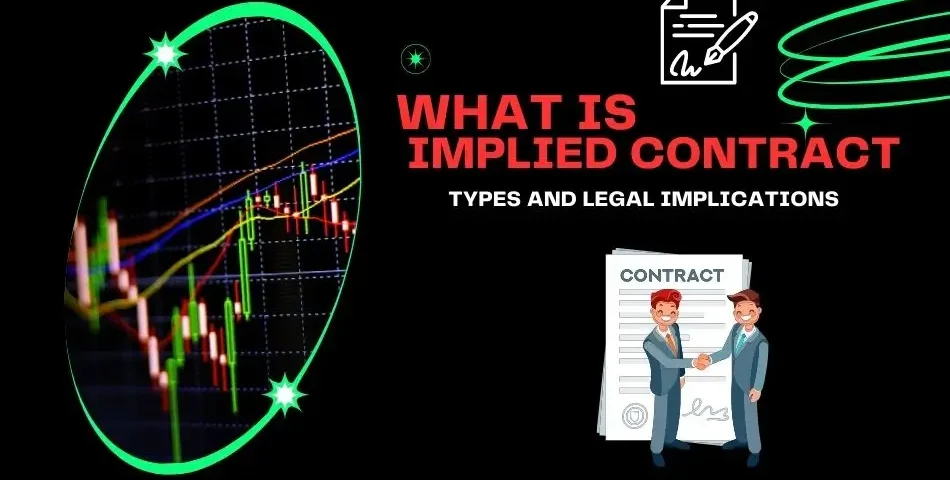
Pip in Forex: A Complete Guide for Traders
September 23, 2024
Double Top Pattern: A Complete Guide for Traders
October 1, 2024Understanding Implied Contracts: Definition, Types, and Legal Implications

implied contract
What is an Implied Contract?
An implied contract is an agreement that exists even though it is not expressly outlined in words but arises from the actions, conduct, or situations of the persons involved. In contrast to express agreements which are documentaries or oral, and made clear some contracts are understood from the surrounding circumstance. Acceptance of terms and conditions is more or less based on their conduct regarding the dealing.
For instance, you walk into a restaurant and make an order. In this scenario, an implied contract is formed between you and the restaurant. It’s understood that food will be provided, and some consideration is scattered; with no one saying, such words.
Types of Implied Contracts
There are two primary types of implied contracts:
- Implied-in-Fact Contracts
- Implied-in-Law Contracts (also known as Quasi-Contracts)
Implied-in-Fact Contracts
An implied-in-fact contract exists based on the actions or circumstances of the parties that indicate that such a contract exists. Both parties understand the intention behind the obligations, even though they have not expressed their terms. A court could review the case of the parties and the behavior and determine that there was a contract that was contemplated by the behavior of the parties.
For example, if someone hires a freelance subcontractor without a proper contract and compensates him for his services, an implied-in-fact contract would be made. This would be assumed from the actions of both sides that there is an expectation for work to be done and payment offered.
Implied-in-Law Contracts (Quasi-Contracts)
An implied-in-law contract, or quasi-contract, is the creation of the court to prevent a party from being unjustly enriched at the expense of the other. A true case of an implied-in-fact contract differs; there is no desire on the part of the parties involved to enter into a binding agreement, and yet the courts impose one for purposes of justice.
There are some situations under which the law necessitates the obligation to compensate for services that were rendered despite the fact of no contractual agreement. A typical scenario is a situation where a doctor attends to an unresponsive person requiring medical and there is no prior agreement with the patient. The patient did not consent to the treatment at that moment however they are legally bound to reimburse the performer’s expenses incurred under a quasi-contract.
Legal Liability In Implicit Contracts
When it comes to an implied contract, though a contract may not be written down or pronounced, it is treated with the same level of seriousness as an express undertaking. When two or more persons are engaged in an implied contract, the obligations and liabilities arising out of all of them are implied from their conduct.
Differences Between Implied Contracts and Express Contracts
If an implied contract exists then it is reasonable to assume that its terms can also be enforced by the law and equity. For instance, if an implied agreement is violated (ie one party does not execute what is implicit), that other party may go to law against that other party for some form of corrective justice like payment of money for injured feelings. The circumstances under which the courts interpret the nature of the transaction and the boundaries of the obligations involved are copiously laid out in the law.
Both implied contracts and express contracts are identifiers of the commitments made by the parties, but the two are distinct. In this type of contract, all specified elements are verbally or in writing agreed upon. Implied contracts, on the other hand, are based on deeds, events, and laws.
In addition, these two types of contracts are very distinct, and understanding them is important, especially in a business where one party may want to engage in conduct to court another, and in the process rely on a course of conduct that does not exist or on an understanding reached in the past.
Common Scenarios Involving Implied Contracts
Several everyday situations can give rise to implied contracts. These include:
- Employment Relationships: If an employer promises certain benefits or job security based on long-standing practices, an employee might reasonably assume there is an implied contract.
- Professional Services: Hiring a service provider without a formal agreement can lead to an implied contract, especially if both parties act as though an agreement exists.
- Retail and Services Transactions: When purchasing goods or services, implied contracts often form based on industry norms and consumer expectations.
The Role of Implied Contracts in Business
In business, informal contracts play an important role in situations where formal contracts are not practical or necessary. Business relationships that rely on established practices or industry practices can create agreements between parties. However, business owners need to understand the legal implications these contracts can have, as disputes can arise if one party feels they are not clear or fair..
Conclusion
Understanding the contract that is expressed and done is important in navigating personal and professional relationships. Whether it’s a mutually agreed-upon contract or an implied contract upheld by the courts, these agreements are legally binding and should not be taken lightly. Knowing the existence of an implied contract can avoid potential disputes and ensure that both parties fulfill their obligations. Knowing the different types of contracts, their legal obligations, and their role in business, individuals and organizations can make decisions and protect their interests in different activities.
While Exploring this article you may visit our top articles: click here to read more about trading.



